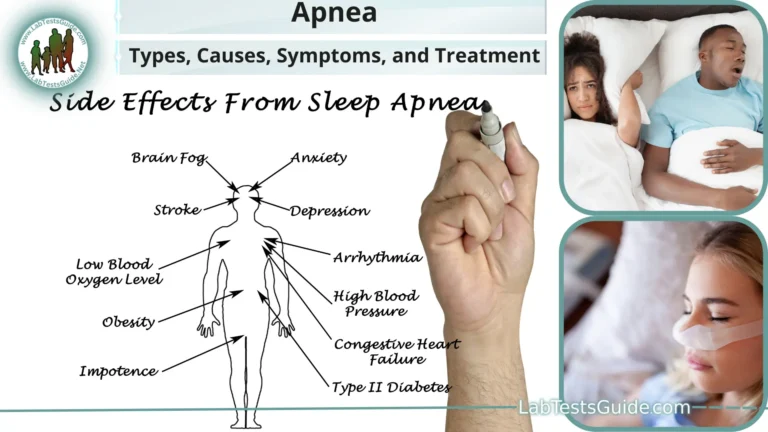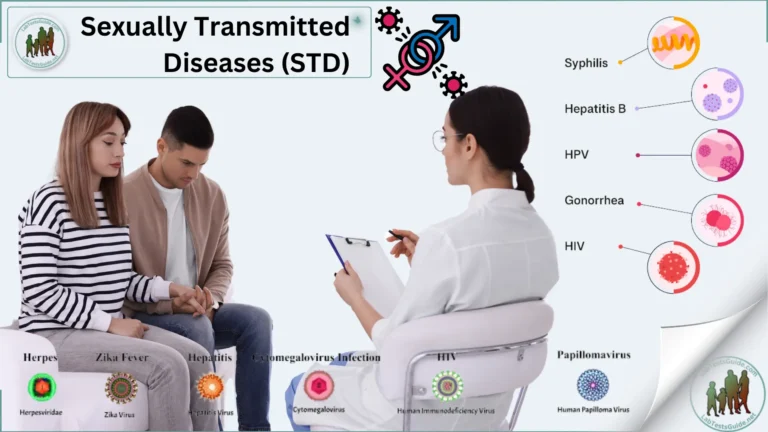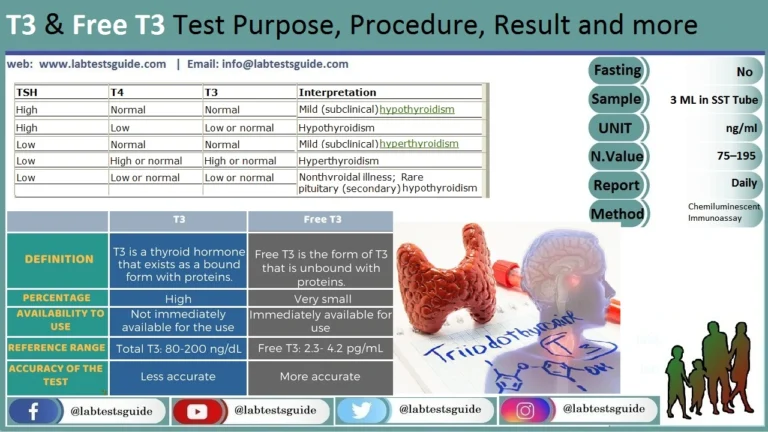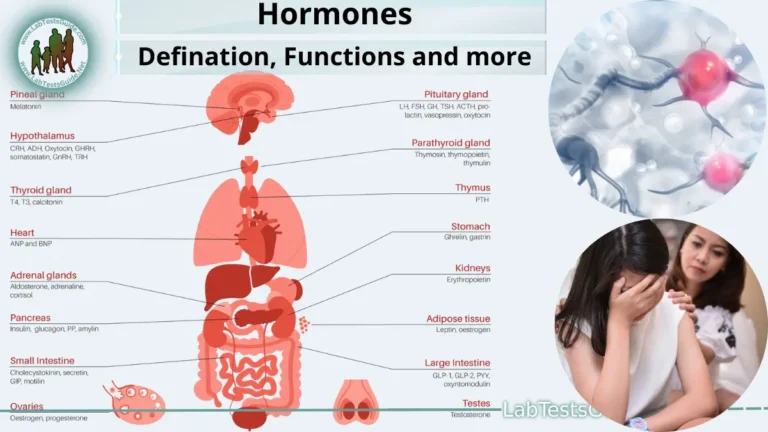Hypothyroidism is a common condition in which the thyroid does not create or release enough thyroid hormone into the bloodstream. This causes your metabolism to slow down. Also called an underactive thyroid, hypothyroidism can cause you to feel tired, gain weight, and not tolerate cold temperatures. The main treatment for hypothyroidism is hormone replacement therapy.
Inadequate production of thyroid hormone from the thyroid gland OR
Insufficient stimulation of the hypothalamus or pituitary gland
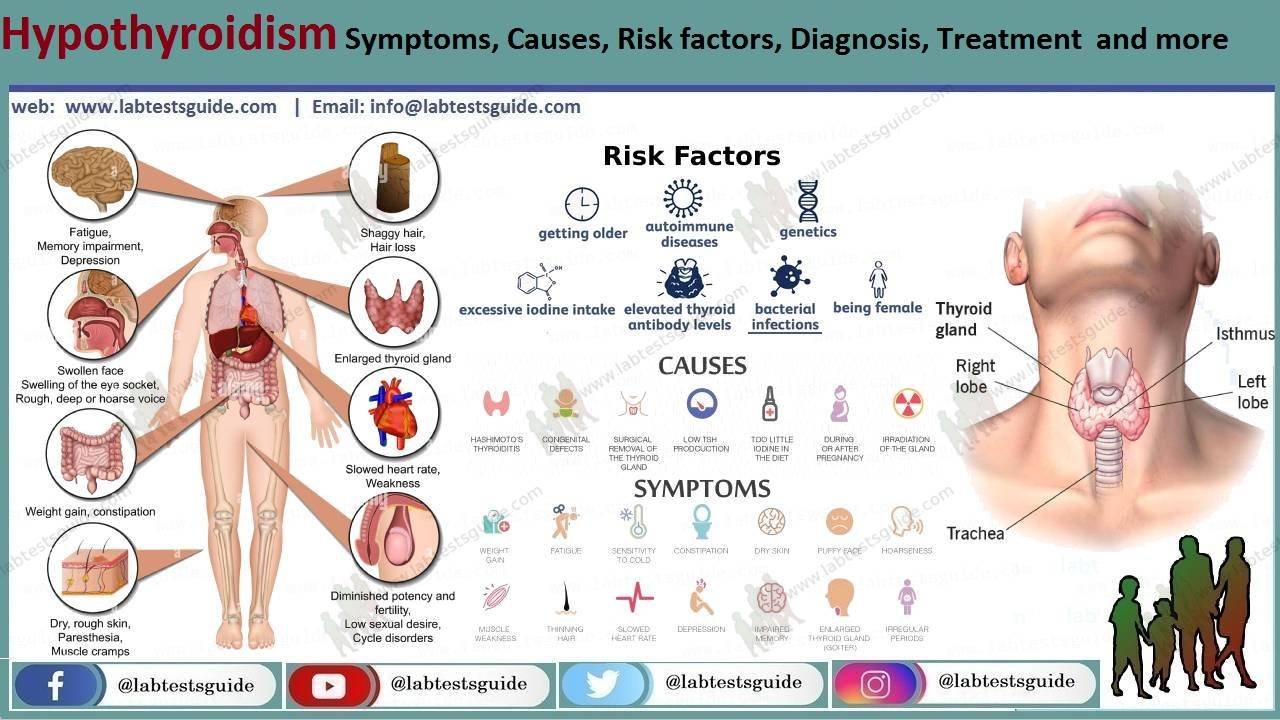
What is Thyroid Gland :
Your thyroid is a small, butterfly-shaped gland in the front of your neck. It produces hormones that control how the body uses energy. These hormones affect almost every organ in your body and control many of your body’s most important functions. For example, they affect breathing, heart rate, weight, digestion, and mood. Without enough thyroid hormones, many of your body’s functions slow down. But there are treatments that can help.
Hypothyroidism vs. Hyperthyroidism
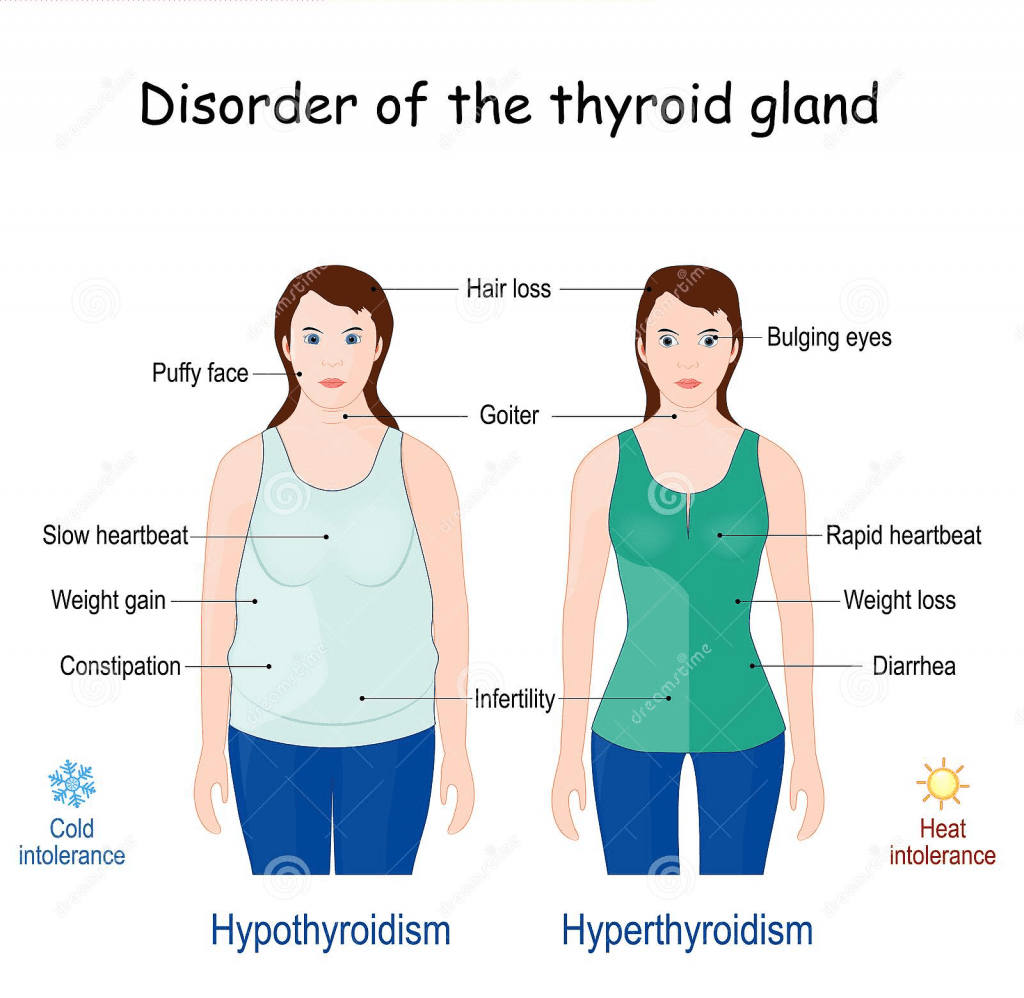
| Hypothyroidism | Hyperthyroidism |
|---|---|
| Gland can’t make enough Hormones | Gland can make Too Much Hormones |
| Slow heartbeat, Weight Gain, Feeling extra cold, | Fast heartbeat, Weight loss, Feeling extra warm |
| Hair loss, Decrease in sweating, | Hair loss, Increase in sweating, |
| Causes symptoms like slowed metabolism | Causes symptoms like Fast metabolism |
 Signs & Symptoms of Hypothyroidism :
Signs & Symptoms of Hypothyroidism :
- The signs and symptoms of hypothyroidism vary widely, depending on the severity of the hormone deficiency.
- At first, you may hardly notice symptoms like fatigue and sluggishness.
- Increased sensitivity to cold.
- Constipation.
- The skin is pale and dry skin.
- There is swelling of the face due to edema.
- The patient develops hoarseness in the voice.
- There is an increase in cholesterol level.
- The patient also gains weight.
- There are muscle aches, tenderness and stiffness.
- There is muscle weakness
- There may be pain, stiffness, or swelling of the joints.
- Female patients develop heavier menstrual periods.
- The patient may develop signs of depression.
- Usually these patients become obese.
- There may be joint pain.
- This patient may suffer from infertility.
- These patients may develop heart problems.
- In untreated cases, signs and symptoms worsen.
- Constant stimulation of the thyroid leads to enlargement of the gland, which is called a goiter.
- Advanced hypothyroidism is known as myxedema.
- Myxedema includes more signs and symptoms like :
- Low blood pressure.
- Decreased breathing.
- Decreased body temperature.
- Unresponsiveness and even the patient may go into a coma.
- Myxedema may be fatal in some patients.
 Causes of Hypothyroidism :
Causes of Hypothyroidism :
- Autoimmune thyroid disease.
- Iodine deficiency.
- Iodine induced.
- Goitrogen exposure.
- A defect in hormone synthesis.
- Thyroid ablation by surgery or radiation.
- Thyroid agenesis or dysgenesis.
- Hypothalamic-pituitary disease.
- Hashimoto’s disease, an autoimmune disorder in which your immune system attacks your thyroid. This is the most common cause.
- Thyroiditis, inflammation of the thyroid
- Congenital hypothyroidism, hypothyroidism that is present at birth
- Surgical removal of part or all of the thyroid
- Thyroid radiation treatment
- Mertain medications
- In rare cases, a pituitary disease or too much or too little iodine in your diet
 Rick factors of Hypothyroidism :
Rick factors of Hypothyroidism :
You are at increased risk of hypothyroidism if you:
- you are a woman
- They are over 60 years old
- You have had a thyroid problem before, such as goiter.
- Have had surgery to correct a thyroid problem
- Have had radiation treatment to the thyroid, neck, or chest
- You have a family history of thyroid disease.
- She was pregnant or had a baby in the last 6 months
- She has Turner syndrome, a genetic disorder that affects women.
- You have pernicious anemia, in which the body can’t make enough healthy red blood cells because it doesn’t have enough vitamin B12.
- He has Sjogren’s syndrome, a disease that causes dry eyes and mouth.
- have type 1 diabetes
- have rheumatoid arthritis, an autoimmune disease that affects the joints
- He has lupus, a chronic autoimmune disease.
 Diagnosis of Hypothyroidism
Diagnosis of Hypothyroidism
Your health care provider can use many tools to make a diagnosis:
- A medical history, including questions about your symptoms.
- a physical exam
- Thyroid tests, such as
 Treatments:
Treatments:
Surgical removal of part or all of the thyroid
When surgeons remove part of the thyroid, the remaining part can make normal amounts of thyroid hormone. But some people who have this surgery may develop hypothyroidism. Removal of the entire thyroid always results in hypothyroidism.
Surgeons may remove part or all of the thyroid as a treatment for
- hyperthyroidism
- a big goiter
- thyroid nodules, which are noncancerous growths or lumps in the thyroid that can produce too much thyroid hormone
- small thyroid cancers
Thyroid radiation treatment
Radioactive iodine, a common treatment for hyperthyroidism, gradually destroys thyroid cells. If you receive radioactive iodine treatment, it is likely that over time you will develop hypothyroidism. Doctors also treat people with head or neck cancer with external beam radiation therapy which can also damage the thyroid if included in treatment.
Medicines
Some medications can interfere with the production of thyroid hormones and cause hypothyroidism, including certain
- heart medications
- bipolar disorder
- cancer drugs
Several recently developed cancer drugs, in particular, can affect the thyroid directly or affect it indirectly by damaging the pituitary gland.
Iodine deficiency
Iodine deficiency occurs infrequently in the United States, but it is the most common cause of hypothyroidism in other parts of the world. Iodine, which is needed to make thyroid hormone, is found in foods including:
- Iodized salt
- Dairy products
- Seafood
- Eggs
FAQs
Q: What is the main cause of hypothyroidism?
Ans: Hashimoto’s disease, an autoimmune disorder, is the most common cause of hypothyroidism. With this disease, your immune system attacks the thyroid. The thyroid becomes inflamed and cannot produce enough thyroid hormones.
Q:Can hypothyroidism go away?
A: For those with particularly low levels of thyroid hormones, hypothyroidism is a life-long condition that will need to be controlled with medication on a regular schedule. It can be controlled very well and you can live a normal life with hypothyroidism.
Q: What foods to avoid if you have hypothyroidism?
A: Soy foods: tofu, tempeh, edamame, etc.
Certain vegetables: cabbage, broccoli, kale, cauliflower, spinach, etc.
Fruits and starchy plants: sweet potatoes, yucca, peaches, strawberries, etc.
Nuts and seeds: millet, pine nuts, peanuts, etc.
Q: How can I increase my thyroid naturally?
A: Superfoods for the thyroid
- Soasted seaweed Seaweeds, such as seaweed, nori, and wakame, are naturally rich in iodine, a trace mineral necessary for normal thyroid function. …
- Salted nuts. Brazil nuts, macadamia nuts, and hazelnuts are excellent sources of selenium, which helps support healthy thyroid function. …
- Baked fish. …
- Dairy products. …
- fresh eggs
Possible References Used


